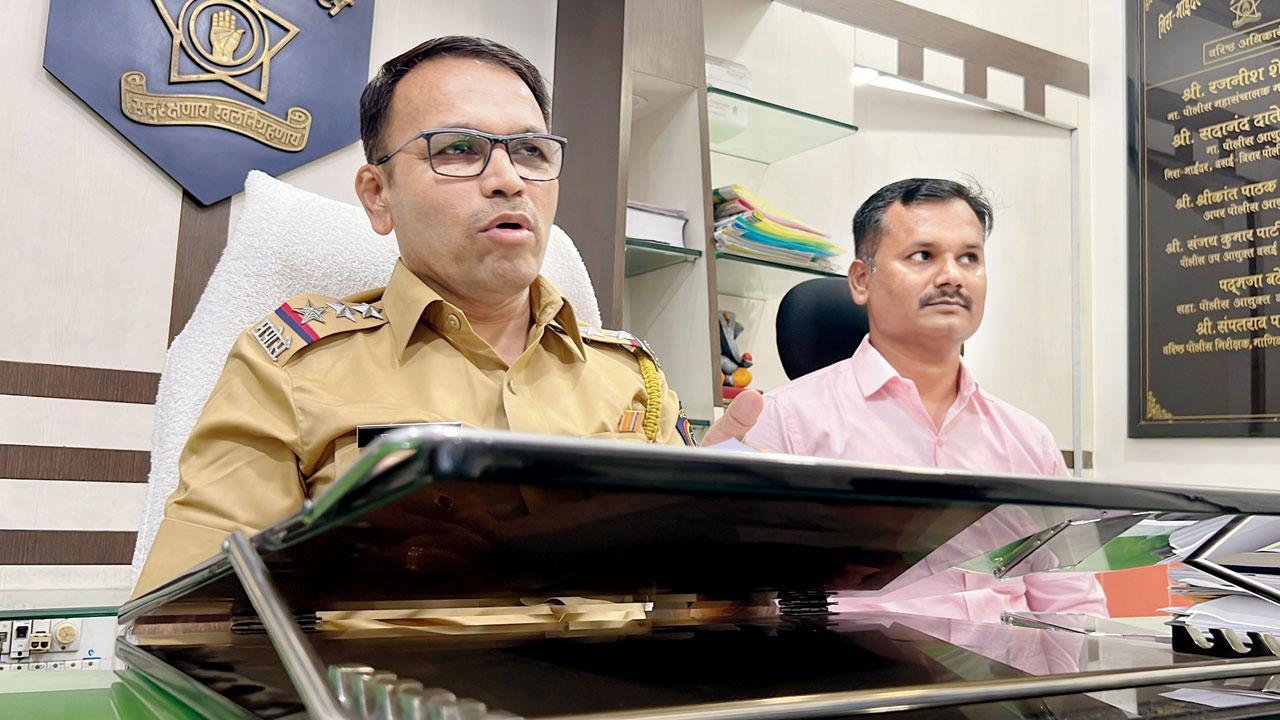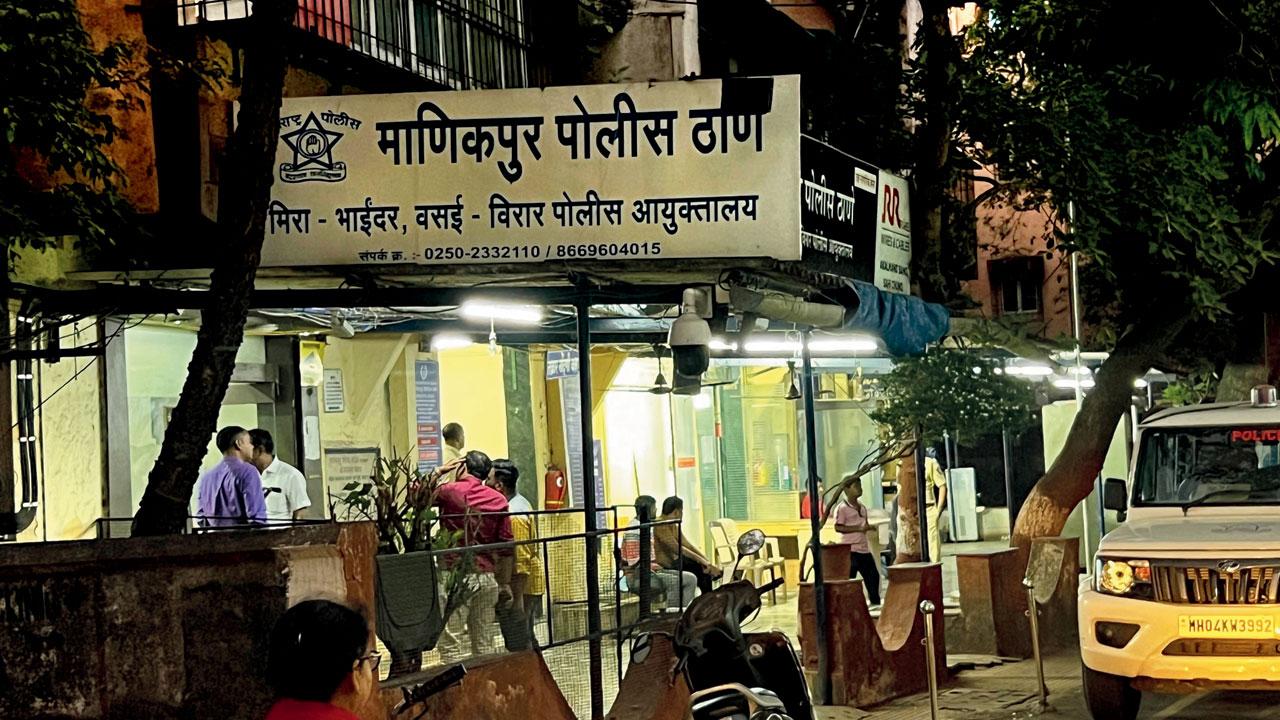Delhi police say MBVV cops took almost a month to inform them about the case; the latter claim it was their probe that helped crack the gruesome murder

SI Sampat Patil (in uniform) with API Sachin Sanap of Manikpur police station. Pics/Hanif Patel
AMID the ongoing investigation into the murder of Shraddha Walkar in Mehrauli area of the national capital, the cops from Delhi and Mira-Bhayandar, Vasai-Virar (MBVV) are sparring over the latter's action on a missing person complaint filed in mid-October.
ADVERTISEMENT
While Delhi police have claimed that the Manikpur police were late in alerting them about the missing person complaint, which gave Walkar's live-in partner and killer Aftab Poonawala plenty of time to destroy evidence.
Rejecting their charge, the senior inspector (SI) from the Manikpur police station said they followed the standard operating procedures (SOPs) after the 26-year-old woman's father Vikas filed the complaint on October 12. It was their action that helped the Delhi cops nab Poonawala, said the SI.
Delhi police's claims
An officer from the Delhi police told mid-day that the Manikpur police did not send Walkar's photographs across prominent locations, like railway stations, interstate bus stands, airport, regional passport office and border checkpoints through law enforcement personnel.
Also read: Shraddha Walkar murder: Process for Aftab's polygraph test begins

Manikpur police station in Vasai
“This should have been done within a week of filing the missing person complaint, after taking a written consent of her parents,” said the officer, who is part of the Delhi police team that is in Vasai to probe Walkar's death.
“And if they [Manikpur police] knew that Walkar, who was living with Poonawala, disappeared from Delhi suddenly, they should have immediately contacted Mehrauli cops. What stopped them from doing so?” he asked.
“Had the Manikpur police contacted us immediately, we would have conducted an inquiry in the neighbourhood, her place of work and other places... The Manikpur police had called Poonawala twice, but did not bother to inform the Delhi cops. They informed us only after learning that he had killed her long back," he added.
'We are struggling'
A senior officer from Delhi police said, “The missing complaint was filed on October 12, but the Manikpur police informed us on November 9. Had they informed us before, we would not have struggled today to piece together the pieces of evidence, which he claimed to have scattered in the jungle and a pond.” A source at Manikpur police station told mid-day that the special team formed to probe the missing complaint had immediately contacted Poonawala.
“Vikas Walkar, father of Shraddha, had approached Manikpur police only after her close friend Laxman Nadar told him that she is not reachable since mid-May. Here, Assistant Police Inspector (API) Sachin Sanap and his team, whose investigation unearthed the murder, were told that Shraddha lived with her boyfriend Poonawala in Delhi. So, the investigating team immediately contacted Poonawala, but he kept misleading the Manikpur police, saying she had left the house after a fight in May,” said the source.
A Delhi police source said that the chances are very high that Poonawala destroyed the remaining pieces of evidence after getting this call from the Manikpur police. "He was caught on camera in Delhi, walking with two bags in the wee hours of October 18, just six days after the missing complaint was filed," the source added. “The CCTV camera footage of October 18 clearly proves that Poonawala was destroying evidence,” the officer said.
'We helped Delhi cops...'
API Sanap told mid-day that he first contacted Poonawala on October 20 and he came to Vasai on October 23. SI Sampat Patil from Manikpur police station said, “We followed the SOPs and took suo motu cognisance in this case. Our investigation helped them crack such a big murder case and arrest the accused. How can they say that we informed them late?”
“It took us time to retrieve the call data records of the missing woman and the accused. We informed the Delhi police after our investigation was over,” Patil added. Meanwhile, a source in Manikpur police station said that the senior officers were kept in the loop about the development in the missing complaint.
Another source in Manikpur police station said that when Poonawala blurted out the truth about the murder, the investigating team thought of arresting him. "However, they did not do so, as they had to produce him in Vasai court after registering Zero FIR and then hand him over to the Delhi police. Hence the investigating team informed the seniors who suggested that Poonawala be allowed to leave for Delhi. They asked the team to keep a watch on him and inform the Delhi cops,” said the source.
“After consulting the senior officers of MBVV police, the investigating team was personally sent with the case documents to Delhi to apprise the senior cops there,” the source added. A senior MBVV officer said, “Considering the seriousness of the matter, we sent the investigating team in-person with the case documents, else we would have easily couriered the files to Delhi for them to investigate.”
A Delhi police officer, however, believes that "the MBVV police should initiate a departmental inquiry to know why Manikpur police informed us almost a month after they registered the missing person complaint”.
What is the SOP in missing cases
The first step is to take the details of the missing person, explains Pravin Dixit, former director general of police of Maharashtra. "If the officers believe that there is a possibility of kidnapping, s/he has to work secretly to ensure that the kidnapper is not aware and does not harm the victim," he said. Cases like that of Walkar, wherein she was estranged with her family and was living with her boyfriend, but the father suddenly files a missing person complaint, "are always treated as family dispute". "Cops start searching for the missing person based on the details available before them, like in such cases, the family puts the blame on the partner, so they have to call the suspect. The moment they notice something suspicious they have to work accordingly,” Dixit added. The basic job of the police is to find the last location of the missing person. "If it does not match with the statements of people related to the case, cops should visit the place or immediately inform their counterpart through official channels so they can take the lead."
 Subscribe today by clicking the link and stay updated with the latest news!" Click here!
Subscribe today by clicking the link and stay updated with the latest news!" Click here!







